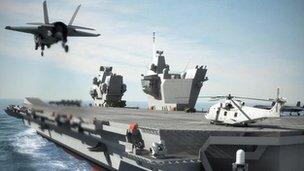MoD spending on equipment must be realistic, say MPs
- Published

The committee said the costs of the new class of aircraft carriers had already risen by £2.8bn
The Ministry of Defence may be "over-optimistic" about how much its military equipment budget is under control, an influential group of MPs has said.
The Public Accounts Committee said the MoD was still only able to say its budget was "broadly in balance".
It warned that public spending cuts may make planned increases in the equipment budget from 2015 "unrealistic".
Defence Secretary Philip Hammond said the government had embarked on a "radical" programme of reform.
The committee said the estimated cost of the 15 largest defence projects rose by £466m in 2010-11.
'Expenditure gap'
The MoD's budget situation comes despite the 2010 strategic defence and security review and two further cost-saving exercises, the committee said.
But there were signs of improvement in the equipment programme, it added.
The committee said: "It is unacceptable that the department still cannot identify the extent of the current gap between resources and expenditure.
"The department is basing its current 10-year equipment plan on Treasury planning assumptions that are now likely to prove over-optimistic.
"The department was told at the time of the Comprehensive Spending Review settlement that it could expect 1% real terms equipment budget increases from 2015.
"It is planning its budget on this basis, but in the light of current economic conditions that assumption may be unrealistic."
Schemes cancelled
The total cost of the 15 largest projects had increased by £6.1bn to £60bn since they were individually given the go-ahead, an 11.4% rise.
These projects are forecast to be completed a total of just under 27 years late, an average of more than a year and nine months each.
The MPs acknowledged there had been generally lower cost increases and fewer technical problems on more recent projects.
But it said decisions to cancel or delay schemes and to cut equipment numbers had added significant costs.
Citing examples of cost increases, the committee said:
The Astute submarines had been delayed, leading to increased costs of £1.9bn
Cancelling the Nimrod at such a late stage after repeated delays had wasted £3.4bn, with no new capability being added
The forecast cost of the Queen Elizabeth aircraft carriers had so far risen by £2.8bn since they were first approved in 2008
The committee chairman, Labour MP Margaret Hodge, said: "Much of the cost increase over the last decade has been down to the fact that the estimates for large programmes significantly underestimated the real cost.
"Rather than the over-optimism which has held sway at the start of major projects, what is needed is realism - about the complexities of projects, the long-term costs of decisions taken today and the implications down the line of short-term budget cuts."
Mr Hammond said the government was "close to eliminating the black hole in the MoD's finances" and was soon to set out an "affordable, deliverable programme".
"This will see us invest more than £150bn in the right equipment for our armed forces while achieving value for money for UK taxpayers."
He blamed the financial situation on the past Labour-led government and said: "The overall increase this year was seven times lower than Labour's last year in office, which saw a cost increase of over £3.3bn."
He added: "Scrapping the ill-fated Nimrod MRA4 was one of many tough but necessary decisions we had to take to deal with an equipment programme that was out of control.
"The aircraft were more than eight years late, almost £800m over budget, and the unit cost of each aircraft had soared by 200%, with no guarantee they would ever be fit to fly.
"The Astute programme is now on a much firmer footing with the first boat in service and the second due to leave Barrow soon."
- Published9 February 2012
- Published8 February 2012
- Published25 January 2012
- Published15 December 2011
- Published29 November 2011
- Published16 November 2011